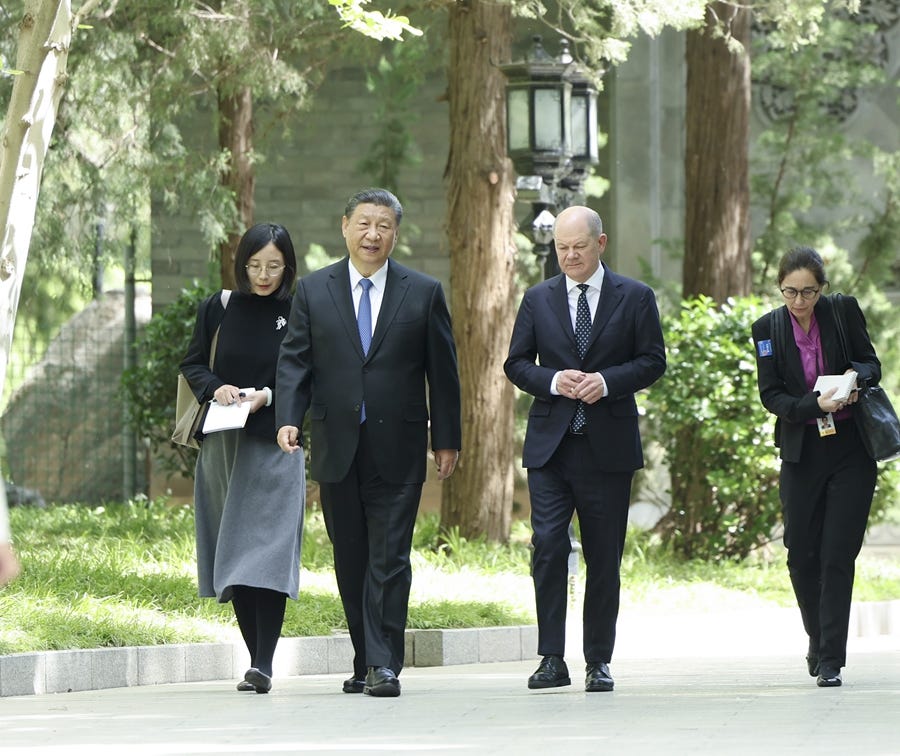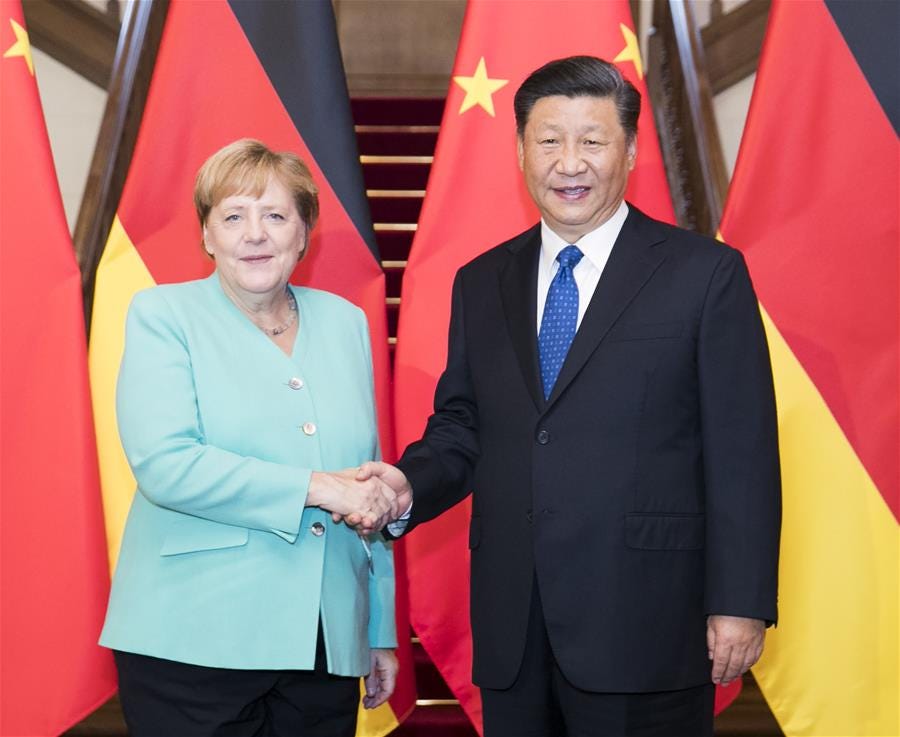This year marks the 10th anniversary of the establishment of the all-round strategic partnership between China and Germany. A few days ago, German Chancellor Olaf Scholz was received by President Xi Jinping at the Diaoyutai State Guesthouse in Beijing. Although it seems that 中德领导人漫步钓鱼台 "the stroll of China-German leaders around the grounds of Diaoyutai State Guesthouse" did not ignite heated discussions on the Chinese internet to the extent of Yellen's "food diplomacy," Scholz's visit remains significant.
During Scholz's visit, President Xi and Premier Li Qiang met and held talks with him to exchange views on bilateral relations and issues of common concern. One of the focuses this time undoubtedly is China's response to the issue of overcapacity. Both Xi and Li mentioned this in their meetings with Scholz, respectively.
Xi commented on the claims regarding "overcapacity" during his meeting with Scholz, saying:
中国出口电动汽车、锂电池、光伏产品等,不仅丰富了全球供给,缓解了全球通胀压力,也为全球应对气候变化和绿色低碳转型作出巨大贡献。
China's export of electric vehicles, lithium batteries and photovoltaic products has not only enriched global supply and eased global inflationary pressure, but also made important contribution to the global response to climate change and the green and low-carbon transition.
Li also mentioned this when he met with Scholz:
以市场眼光看,产能多少是由供需关系决定的,供需平衡是相对的,不平衡是普遍的,适度的产大于需有利于充分竞争和优胜劣汰.......中国的新能源产业优势是靠真本事获得的,是通过充分的市场竞争塑造的,而不是靠政府补贴形成的。
From a market viewpoint, the amount of production capacity is determined by the relationship between supply and demand, and having production moderately greater than demand is conducive to full market competition and promoting the survival of the fittest in the market......China's new-energy industry has gained advantages through self-improvement and sufficient market competition, rather than by government subsidies.
Today's piece include the translation of some key paragraphs from two popular WeChat blog posts on Scholz's recent visit to China, both have received more than 100,000 clicks (“10万+”) from readers in China, a remarkable feat for articles published on WeChat blogs.
Additionally, I've invited Ren Ke, a senior journalist from Xinhua News Agency, to share his insights on this visit. Ren has extensive experience in Europe, from 2017 to 2021, he served as a Xinhua correspondent in Berlin, focusing on Germany's domestic politics and foreign policies. From 2021 to 2023, Ren was the deputy editor-in-chief of Xinhua's Europe Regional Bureau in Brussels and a correspondent covering EU institutions. Notably, in February 2022, Ren was among the first Chinese correspondents to report on the Russia-Ukraine conflict after traveling to Ukraine.
The first piece is from an article on the independent Wechat blog, Zhengshitang2019 (政事堂2019), dated April 16.
Scholz, Here He Comes Again -- Zhengshitang2019, April 16 朔尔茨,他又来了
Scholz visits China again, and he has become the first Western leader to make a second visit to Beijing after the 20th National Congress of the Communist Party of China (CPC). This move signifies Germany returning to its traditional diplomatic pattern with China.
Since Angela Merkel's sudden shift from a tough stance on China to a pro-China stance in 2006, her every visit to Beijing has been followed by a visit to another Chinese city closely linked to German trade and commerce once every year.
The visit of the German leader has set a precedent for other European leaders. The once frozen relations between China and Europe are set to accelerate their recovery.
Of course, Scholz won't return empty-handed either.
Since the "Two Sessions" earlier this year, "equipment renewal" has become a major task for governments at all levels and central enterprises, with various reports being submitted.
Different from the previous years' focus on domestic substitution mainly on the consumption end, this round of "equipment renewal" primarily targets the production end, and the most advanced equipment in global production comes from none other than Germany, known for its rigor.
Coincidentally, besides a few traditional key enterprises in China-German relations, Scholz has brought along new players from Germany's chemical, electronic, and machinery industries, perfectly matching the national policies China is about to implement, giving the impression of bringing a bid team to compete for the "equipment renewal" project.
The second piece is from an article written by Hu Xijin, the former editor-in-chief of Global Times. The piece was published on his WeChat blog Huxijinguancha (胡锡进观察), dated April 15.
In November 2022, when China's epidemic prevention and control measures were gradually being relaxed, Scholz became the first leader of the Group of Seven (G7) countries to visit China. Less than a year and a half later, his second visit to China has already signaled his strategic choice.
However, that's not enough for him. Through his visits to China, he needs to show German officials and the public, along with the moving camera, what China looks like today and promote consensus on strengthening economic ties with China.
German general elections are held every four years, and new elections will come a little over a year later. Germany's economic recovery has been lukewarm, and its involvement in the Russia-Ukraine conflict has been extensive but so far ineffective. If he can persuade China to make some move valuable to Germany regarding the Russia-Ukraine conflict during this visit., this will be widely seen as a boon for Scholz's bid for re-election.
In the West, nothing is more important than elections, and when Scholz ties the fate of the next election to his achievements in diplomacy with China, it shows that China has been placed at the forefront of his interests. In matters as crucial as these, there is no room for anything but absolute sincerity and substantial achievement (in his visit to China).
......
Competition exists between Europe and China in various fields such as EVs and solar panels, but in which world does competition not exist? While Germans are clamoring for "de-risking" with China, they are also increasing their investments in the Chinese market. The slogan of "de-risking" contains both genuine concerns and a strategy for bargaining with China under pressure from U.S. "decoupling."
In conclusion, both Scholz and Macron are advocates of developing relations with China. As the most influential figures in Europe, their actions represent their stance on how to deal with China. We see a huge gap in the stance towards China between the United States and Europe. China's strategic initiative is not achieved through maneuvering; it is the inevitable result of China's real achievements and its changing face of economic development.
The third piece was written by Ren Ke. In an article titled "Downplaying value differences, Scholz’s visit shows consistency of Germany-China ties," Ren shares his views on Scholz's visit to China:
The anticipation surrounding German Chancellor Olaf Scholz's visit to China was met with a warm reception. The visit highlighted the steadfast nature of China-Germany relations. This stability and consistency not only benefit both countries, but also extends to the European Union and the global economic recovery.
In many ways, Scholz's visit echoes the trajectory of Germany-China relations over the past decade, particularly during Angela Merkel's tenure as chancellor. Merkel's frequent visits to China underscored a significant deepening of economic and political ties between Berlin and Beijing. Despite differences in political values, she maintained that dialogue and cooperation between Germany and China should persist.
Chinese President Xi Jinping meets with visiting German Chancellor Angela Merkel in Beijing, capital of China, Sept. 6, 2019. (Xinhua)
While relations have remained relatively stable over the past decade, recent years have seen some challenges. Since the current coalition government took office in late 2021, Germany has placed increased emphasis on values in its foreign policies. Some politicians have criticized China on various fronts, accusing China of threatening the Western liberal and democratic systems and lifestyles, and advocating for “de-risking” by reducing economic dependency upon China and strengthening closer ties with like-minded partners.
The change does have reasons. The COVID-19 pandemic blocked exchanges and triggered crises and protectionism. The ongoing Russia-Ukraine conflict broke the European security framework and caused rising energy costs and economic hardships in Europe but tied the trans-Atlantic alliance closer than ever since the end of the Cold War.
As a result of all these reasons, Germany is paying the price. The German economy now has one of the worst performances among the world’s major economies. Many people are unsatisfied with the government in boosting the economy, addressing livelihood and managing migration, leading to a series of large-scale demonstrations and strikes.
Germany’s “de-risking” policies have led to the drops of China-Germany imports and exports. The policies are harmful in alleviating the challenges and pressures Germany is facing now.
The German economy is highly export-oriented and benefits from China's huge market, complete supply chains and abundant labor resources. But “de-risking” has pushed up the costs of German companies, which to some extent has contributed to de-industrialization in Germany.
Fortunately, many German giant companies are not “de-risking” or shifting away from China, instead, they keep expanding their presence, including BASF in Guangdong, BMW in Liaoning, Bosch in Chongqing’s hydrogen enterprise that Scholz visited this time, and Volkswagen in many cities nationwide.
Scholz's focus during the visit was primarily on issues such as overproduction and subsidies in the electric vehicle sector, fair competition, and the Russia-Ukraine conflict, rather than political values that some German politicians often stress. The business delegation with him indicated that both German political and economic circles are willing to do more business in China, showing that the pragmatic mainstream in German politics has gained some upper hand in its China policies.
The stability and consistency of China-Germany relations will not only benefit the two countries with economic complementarity, but also the whole EU as Germany remains the leading economy and one of the dual powers along with France in the bloc.
China and Germany are the world’s second and third largest economies respectively, and both are top exporters, their cooperation is also in the interests of the recovery of the world economy, not to mention addressing climate change, strengthening global governance, finding ways for peace in Ukraine, the Middle East, among others.







I've really enjoyed reading this collaboration, thank you.
You have captured the shifting of the recent internal dominating narrative of "over capacity" to "equipment renewal" .
You cite from an article written by Hu Xijin "In the West, nothing is more important than elections." . The phrase creates a connotative meaning, implying that in China elections are not considered as important as in the West. Whether this is true is up for debate, but this attitute seems to reveal a wide cultural and ideological gulf.
I do not wish make value judgements here but as a Communication Scientist it is fascinating to observe the interplay of Chinese thought and its changing sociology expressed initially in Chinese and translated into the English language.